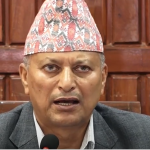
Nepal’s interim government, formed in the wake of the Jan-G movement, has introduced comprehensive spending cuts aimed at ensuring fiscal discipline and promoting austerity. Finance Minister Rameshwar Khanal announced a series of measures targeting wasteful expenditure, prioritizing essential projects, and restricting luxury spending by government institutions.
The decision was taken at a Cabinet meeting on Bhadra 6, which focused on reducing unproductive expenditure and channeling resources towards reconstruction, public services, election management, and economic recovery.
Key Measures Announced
- Projects under Rs 30 million frozen: Budget allocations for small-scale, low-priority projects without proper preparation or duplicate entries in the government’s budget system (LMBIS) will be halted.
- Foreign trips restricted: Government officials, provincial and local representatives can no longer undertake unnecessary foreign visits. Only essential delegations to international conferences will be allowed, capped at 10 members for high-level visits and 3 members for others.
- Meeting allowances scrapped: Officials will no longer receive separate meeting allowances. Housing and other special facilities have also been curtailed.
- Consultancy restrictions: Ministries and agencies are prohibited from hiring external consultants for drafting bills, regulations, and guidelines unless absolutely necessary.
- Utility and rental savings: Offices must cut water, electricity, and communication expenses. Government offices are discouraged from renting expensive buildings in prime business areas.
- Vehicle and asset reuse: Government employees and officials must continue using existing vehicles, laptops, furniture, and other assets instead of procuring new ones. Comprehensive insurance will now be introduced for government properties.
- Ban on new contract/temporary hires: Federal, provincial, and local governments cannot recruit employees outside the approved staffing quotas, except in critical technical positions.
- Secretarial staff reductions: Political leaders, including ministers, will be limited to a maximum of three secretariat staff, while personal secretaries for MPs and other political officials will no longer be funded.
- Restrictions on seminars and workshops: Non-essential training and seminars will be canceled or held online using government halls.
- No investment in loss-making institutions: The government will stop investing in state-owned enterprises that are financially weak or unable to repay loans and dividends.
Priority for Capital Spending and Reconstruction
The government has reprioritized 15 budget headings to ensure funds are directed toward ongoing, high-priority national projects. Unnecessary or unproductive programs will be frozen, while resources will be reallocated to reconstruction, election management, and essential services like education, health, and drinking water.
Government reconstruction projects will be executed under new procedures that emphasize transparent, citizen-friendly structures while discouraging fragmentation of projects into small contracts managed by user committees.
Cuts in Luxury and Distribution-Based Programs
The interim government has also banned the purchase of luxury items and expensive electronics. Distribution-based programs such as free sarees, hand pumps, bicycles, gas subsidies, and household material distributions will no longer be implemented.
Instead, ministries are instructed to focus on effective tax and non-tax revenue collection, recover overdue loans and interest from state-owned enterprises, and immediately clear pending irregularities flagged by the Auditor General.
Institutional Restructuring
The government has also announced institutional reforms, including:
- Dissolving the Land Problem Resolution Commission.
- Bringing the National Investigation Department under the Ministry of Home Affairs.
- Placing the Revenue Investigation Department and Money Laundering Investigation Department under the Ministry of Finance.
- Streamlining overlapping government structures at federal, provincial, and local levels.
Finance Minister Khanal stressed that while similar spending cut announcements were made in the past, this time the implementation and monitoring mechanisms have been strengthened. The Ministry of Finance has directed all ministries, provinces, and local bodies to ensure strict compliance.











